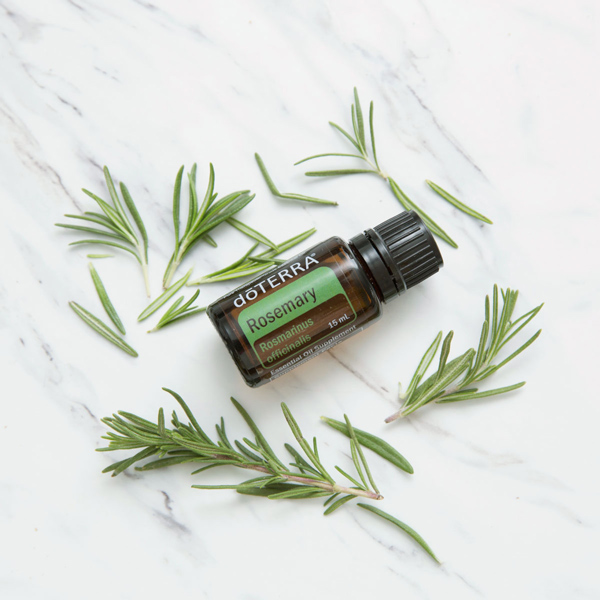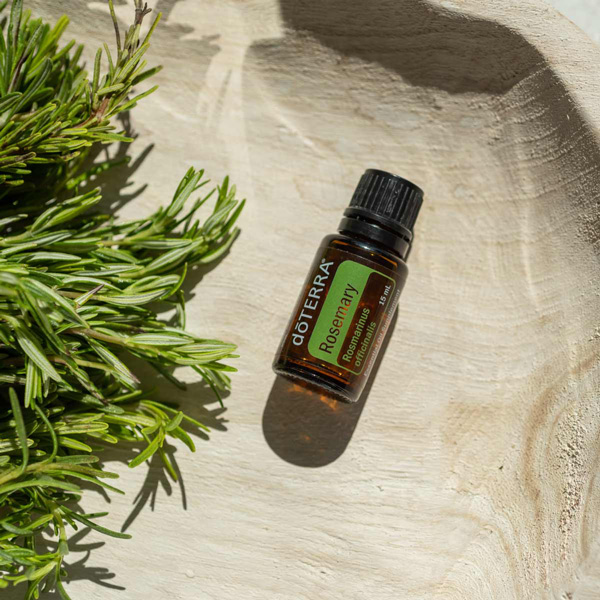Origen: un derivado latino.
Significado "regalo de la tierra."
- Compra
-
Nuestra Historia
- Ver Nuestra Historia Inicio
- Lo que hacemos ...
- Lo que hacemos ...
- Porque lo hacemos ...
-
dōTERRA[doh-teh-ruh]
Rosemary Oil Uses and Benefits
Essential Oil Spotlight
Essential Oil Spotlight


Rosemary Oil Product Description
Though it is famous for its applications in the culinary world, rosemary has uses that reach far beyond cook books or holiday meals. Rosemary essential oil is a versatile essential oil that proves useful in everyday life for things like promoting healthy-looking hair, creating a relaxing massage, cooking healthy meals, and more. It even supports healthy digestion.* Learn more about Rosemary oil and discover the diverse uses for this herbaceous, energizing doTERRA product.
Where to Buy Rosemary Essential Oil
Want to add Rosemary essential oil to your essential oil collection? Learn how to order by visiting our Rosemary oil page. Once you receive your own bottle of potent, pure Rosemary essential oil, you’ll find everyday uses for this product—whether you are cooking, trying to promote healthy-looking hair, or seeking to create a relaxing environment. Most importantly, you’ll have the satisfaction of knowing that this oil is safe to use at home and on your family. When you buy essential oils from doTERRA, you have the assurance that each bottle of oil has been responsibly sourced, thoroughly tested, and carefully produced with your family in mind.

Rosemary Essential Oil Uses and Benefits
- The chemical makeup of Rosemary essential oil gives it renewing properties that can be both energizing and settling—particularly when you diffuse the oil. When you need to study for a big test, memorize your slides for a presentation at work, or just need to finish a project, diffusing Rosemary oil can be helpful. In the essential oil diffuser of your choice, consider diffusing Rosemary oil while studying to help maintain concentration. As the renewing, green aroma of Rosemary oil wafts through the room, you’ll be able to focus on the task at hand.
- Possibly the most common application for the rosemary plant is in cooking. Fortunately, Rosemary essential oil can be used as a substitute in your favorite rosemary-infused dishes. If you have a favorite recipe that calls for rosemary, you can easily add one to two drops of Rosemary oil to meats or traditional entrees in order to add flavor or to support healthy digestion.* Looking for a hearty Rosemary oil recipe? Try this Balsamic Rosemary Marinade to add instant flavor and excitement to any weeknight meal or backyard barbeque.
- Rosemary essential oil can be taken internally to help reduce occasional fatigue and nervous tension.* You can add a few drops of Rosemary oil to a glass of water or to a doTERRA Veggie Capsule. Rosemary oil can also be taken internally if you are striving to support healthy internal organ function.*
- Trying to relax? Let the renewing properties of Rosemary essential oil soothe your body and soul at the end of a long day by creating a relaxing essential oil bath. Adding essential oils to a warm bath can promote a calming, relaxing environment that allows you to take a break—both mentally and physically. Combine Rosemary, Frankincense, and Epsom salt into your bath for a rejuvenating experience when you are in need of a little “me” time.
- Like many other essential oils, Rosemary essential oil can be helpful for promoting full, healthy-looking hair. When you want to promote an abundant-looking head of hair, consider using Rosemary oil when giving yourself a stimulating scalp massage. To improve the scalp massage even further, combine Melaleuca and Rosemary oil together. Whether you are styling or grooming your lovely locks, it is always a good idea to use Rosemary oil for hair.
- Looking for more delicious Rosemary oil recipes? You can quickly turn traditional mashed potatoes into a flavor-filled side dish with a little help from doTERRA Rosemary oil. Whether you are a prepping for a holiday meal, or just want some comfort food, these Rosemary Mashed Potatoes will leave both your tastebuds and your tummy happy.
- Because of its rejuvenating scent and renewing properties, Rosemary oil is often used for massage. Consider combining Rosemary oil with a carrier oil like doTERRA Fractionated Coconut Oil and applying it during massage. To create a soothing massage experience, you can also blend Rosemary oil with Wintergreen to cool and relax the skin. When you want a relaxing massage, mix Lavender with Rosemary oil for stress reduction.

If you want to use Rosemary oil for cooking, check out some of our favorite Rosemary oil recipes:
Rosemary Lemon Hummus
Strawberry Rosemary Crostata
Breakfast Quiche
Want more Rosemary oil DIY’s? Here are a few essential oil hair DIY’s you can try at home that include Rosemary oil:
Plant Description
A member of the mint family, Rosmarinus officinalis is a highly aromatic shrub that is most widely known for its use in traditional dishes like potatoes, stuffing, lamb, turkey, chicken, and more. Ancient people like the Egyptians, Romans, Hebrews, and Greeks considered rosemary to be sacred, and it was often used by healers in these early cultures. Native to Mediterranean areas, this fragrant plant produces leaves from which Rosemary oil is extracted.
Chemistry of Rosemary Oil
Main Chemical Components: 1,8-Cineole, a-pinene, camphor
Rosemary oil includes the chemical constituents 1,8 Cineole and alpha pinene, which are generally known for their renewing properties. The chemical makeup of Rosemary oil contributes to its ability to repel insects and to affect mood. Pinene and camphor are the monoterpenes responsible for Rosemary oil’s ability to deter insects. These chemicals are also what make Rosemary oil so stimulating—allowing it to have enhancing effects on mood. Much like the oil’s uses, the chemical profile of Rosemary oil is extremely diverse.
Oils that Blend Well with Rosemary Oil
The herbaceous, energizing aroma of Rosemary oil makes it the perfect companion for citrus oils like Wild Orange or Lemon. With a scent that resembles an herb garden, Rosemary oil also blends well with floral oils like Lavender or Jasmine. When you want a warm, woody scent, consider combining Rosemary oil with oils like Cedarwood and Frankincense.
Cautions
Possible skin sensitivity. Keep out of reach of children. If you are pregnant, nursing, or under a doctor’s care, consult your physician. Avoid contact with eyes, inner ears, and sensitive areas.

-
Copiado al Portapapeles
- Descargar


